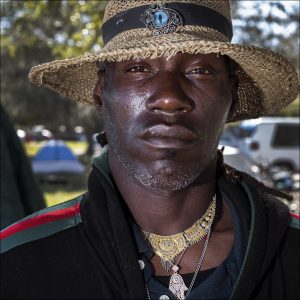By Edysmar Diaz-Cruz
Published July 20, 2020

GAINESVILLE, Fla. — James Scott said he believes lost tribes find one another in Dignity Village.
He propped a tent at the entrance to this encampment outside Gainesville’s largest homeless shelter so he could welcome all who wander in. And he keeps an extra tent handy — just in case a newcomer needs one. It’s a gesture that has helped Scott, known at the camp as “Tygur,” proclaim himself the mayor of Dignity Village.
People come and go, but Tygur’s goal remains the same: Extend a helping hand to those experiencing a rough patch in their lives.
Recently, Tygur patched a crack in the window in one of the shelter’s dorms. An elderly woman prone to pneumonia was sleeping by the window and feared the cold air that seeped in at night. So Tygur returned with duct tape and scraps of trash bags.
His right hand shimmers with chunky silver rings. Sometimes, he struts in a cream-colored suit topped with a straw hat. A faded tattoo of a tiger kisses his left cheek.
“It’s a powerful beast,” he says. “The animal could rip your head off, yet it is gentle with its cubs. A tiger is a protector.”
Dignity Village residents stop to greet Tygur. Many of them are young men who fell through the cracks of society, fell into trouble. They call Tygur “Big Dawg” and Tygur acts the role of godfather to lost souls who need mentoring.
Tygur spends a good chunk of his time guiding young people who are homeless. He calls his program RISE: Respect, Integrity, Security, Empowerment. And he gathers his people every Friday afternoon at 4 o’clock so they can air their struggles and offer one another support. Sometimes, Tygur barbecues over a campfire near his tent.
He has been living on the streets of Gainesville for as long as he can remember, and only recalls remnants of his former life. He had ambitions once, and even aspired to make it as a rapper. He performed at downtown Gainesville joints where he sold CDs. One of his songs, “Gator Bait,” can still be streamed on Spotify and YouTube.
These days, he keeps a large black speaker inside his tent, out of sight from potential thieves. On lazy Sunday afternoons, he lounges away from the heat of the sun and listens to Motown classics like Otis Redding’s “The Dock of the Bay.” Even the security guards at Dignity Village can’t help but sing along.
Tygur can no longer say with any certainty how long he’s lived without a real home. He drifted from his mother’s house once he began volunteering at St. Francis, a local homeless shelter. Eventually, he left altogether.
“I got lost in helping people,” he says.
In 2014, he helped homeless veterans in an encampment near the Depot Park trail. When it was suggested they move to GRACE, they looked to Tygur for guidance. If he went, they would, too.
“When you’re homeless, you have to get to work. You need to build shelter,” Tygur says. “I’m a caring, nurturing person. I have skills for survival and I share my knowledge.”
Dignity Village residents credit him with founding the encampment. And over the years, he’s played many roles — an advocate for the homeless, a peacemaker and a guide. He’s particularly proud of his work as a visual artist — he has an affinity for hieroglyphics and religious symbolism. Sketches of pyramids and the all-seeing eye embellish most, if not all of his belongings at Dignity Village.
As the city and county began closing Dignity Village, Tygur felt nostalgic about the micro-city he helped build. He remembers a time when there were only 25 tents; Now, there were too many to keep track. Now, there was disorder.
“It could have been good for the community with more upkeep,” says Tygur, who had led various volunteer efforts to keep the tent city clean and organized.
But as residents begin dispersing to different parts of Gainesville, they leave behind personal belongings: paintings, wooden furniture, pots and pans. A heap of trash stands in place of where tents used to be. Tygur surveys all that is left and laments the end of Dignity Village.
“This place is going away,” he says. “We built a community. It’s kind of a family.”
Tygur has no problem with building another camp like it. As his deadline to move out approached, he rode a bike around Gainesville and scouted for a new place to live. His search led him to a parking lot behind a secluded appliance store.
The lot had an ample amount of space under the cool shade of trees near a dumpster. Tygur spoke with the business owner, who agreed to let him stay on their property. He knows better than to share this information right away. But if someone needed the help, he’d take them under his wing.
A mosaic of sunlight seeps through his straw hat as he labors through one Saturday afternoon. After two months of selling his artwork and doing odd jobs, Tygur saved $200 and purchased a motor for his three-wheel bicycle. He plans to use it to transport a sturdy wooden box. He calls it “the camper” and soon it could become his new shelter in another place. Just a box next to a dumpster.





